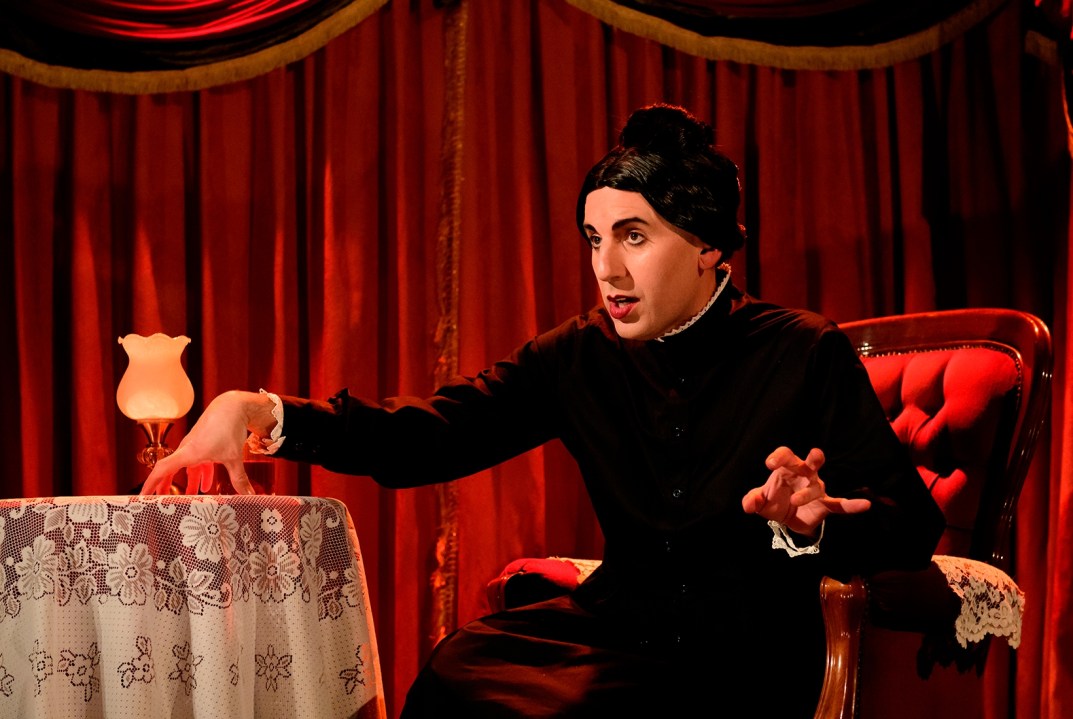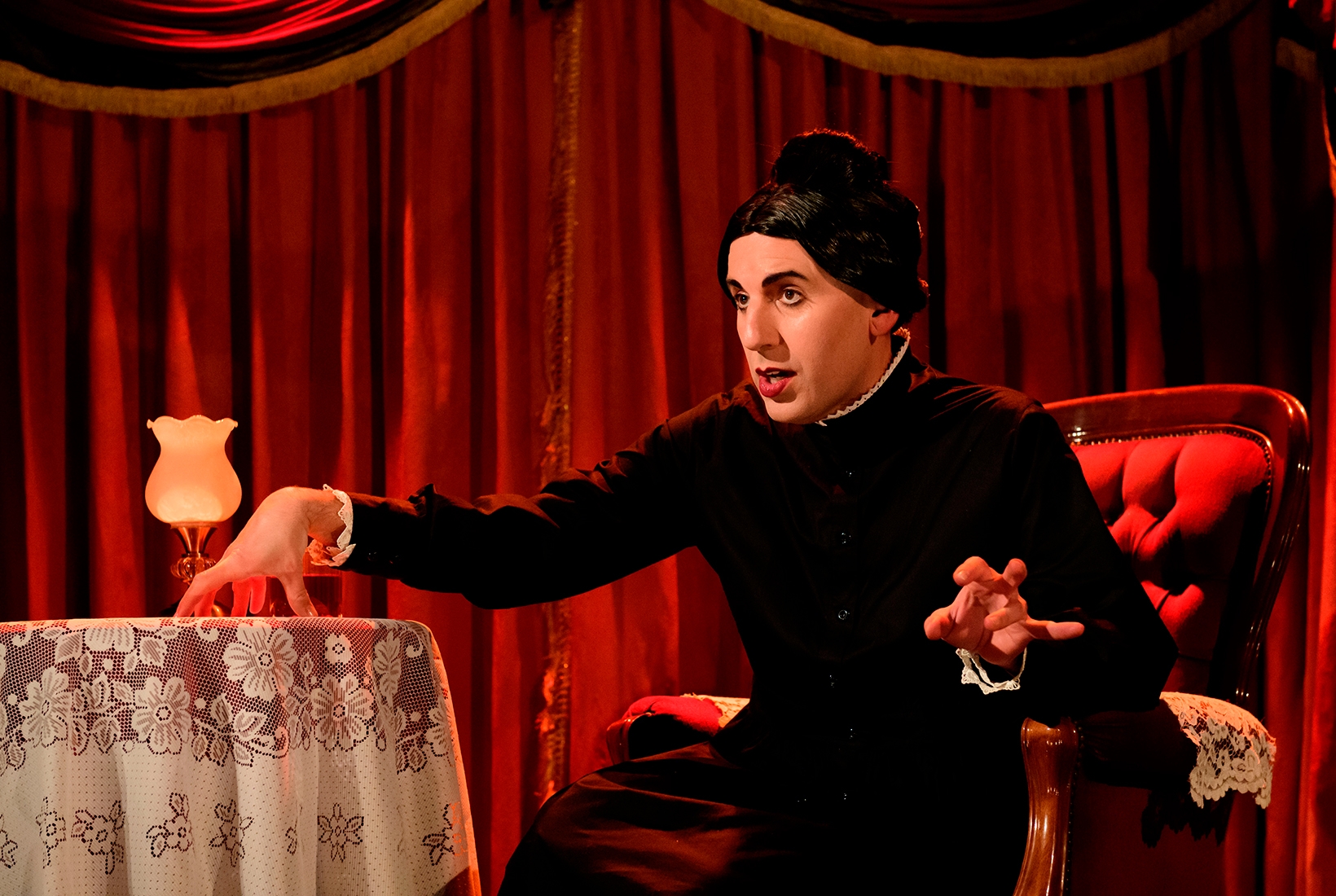The Fabulist Fox Sister is a one-man show about the three American women who are credited with inventing the trade of spiritualism. It all happened by accident. A younger sister discovered that by cracking her toe joints on the floorboards she could generate noises that scared her parents. Kate Fox, the eldest, claimed the sounds were made by a lonely ghost who wanted to communicate with the living. She invited the neighbours around to contact their deceased relatives. The ploy worked and the sisters took their fake routines to New York where they became a huge success. Even the threat of exposure by the press didn’t dent the public’s belief in their powers.
This show covers a lot of ground and it looks at a fascinating moment in history when the decline of traditional Christian faith created a need for more primitive connections with the afterlife. Kate ought to be a fascinating guide on this journey but she’s immensely prickly, cold, heartless and calculating. Grief is just a money-spinner for her. When the American civil war breaks out, she’s ecstatic: ‘Two million people wanting to talk to spirits. Kerching!’ She hasn’t a shred of sympathy for her victims, not even for a businessman with four dead children who promotes her show. She dislikes women intensely, referring to ‘our idiot mother’, and cattily denouncing her sisters for trivial faults.
In the 19th century, three uneducated women created a global industry out of a few cheap theatrical tricks
The script uses a modern vernacular — ‘in New York I seanced my ass off’ — which puts us at a distance from the period rather than opening us up to it. When Kate takes her show to London she wins the admiration of Arthur Conan Doyle. ‘I’m so famous my fans are famous,’ she cackles. Towards the end she confesses that she has a new man in her life, named Jim, who gives her everything she needs. Jim Beam. She died of drink.
The writer/performer, Michael Conley, is a handsome and charismatic actor and he uses catchy show tunes to bulk out the material. But the story is the star here. Netflix could turn this into a series but it may want to hire a female writer with instructions to explore the socioeconomic angle. In the middle of the 19th century, three uneducated women created a global industry out of a few cheap theatrical tricks which they taught themselves. There’s a stroke of genius in here which this script doesn’t quite find.
The Young Vic has made a trio of filmed dramas, Twenty Twenty, with the co-operation of local charities and corporate sponsors. The lighting, editing and camerawork are impressive. The actors, who seem to be amateurs, are gifted. Some of them could work professionally, given a bit of practice. But the writers, who appear to be professionals, have performed like amateurs. Perhaps they felt that a ‘community project’ would be a third-rate job and worked accordingly. Home(Body) begins with a scruffy, cocky man staring down the barrel of the lens. ‘This isn’t a sob story. I know what you were thinking.’ No, you don’t, get on with it. The action moves to a darkened room where five characters in pyjamas appear to be trapped. They’re ushered into a kitchen where they find a plantain. Does it rhyme with ‘mountain’ or ‘sustain’, they wonder. They escape through an oven and into a banqueting room while a male voice-over comments on the action. Then we cut to a street scene where the characters show up, walking around or sitting in parks. Baffling. It looks like the worst Dr Who script ever rejected by the BBC.
The next film, Even At Our Age, is about a dating show for seniors. The white male presenter fears that he’s about to be axed: ‘I hate to say it but they are taking all our jobs… I’m not against diversity.’ Then he’s murdered. The main suspects are a quartet of disgruntled female contestants who appear in scarlet capes shouting: ‘We are the alliance.’ The film’s budget is too small for the complexity of its ideas. And the script can’t decide what it’s doing. First it’s a documentary, then it becomes a whodunnit and finally it morphs into a spoof horror/slasher movie. This muddle should have been sorted out — or thrown out — before the first camera rolled.
Tapestry, about a community choir, has a simple, credible storyline. The choir enter a talent contest. Will they win or not? The film is padded out with low-energy dance routines and melodies performed by tuneless singers who are easier to pity than to admire. Yet the Young Vic seems inordinately proud of this project. Its website invites us to marvel at an offshoot video, The making of Twenty Twenty, as if it were My Fair Lady or Seven Samurai. It needs to try harder or not try at all.








Comments